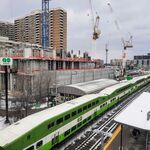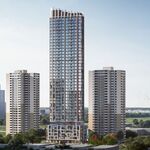GTA home resale prices overheating due to land shortage: report
By Susan Pigg Business Reporter
The shortage of land available for new housing across the GTA has caused resale home prices to overheat by 15 per cent and cost some 22,000 construction and related jobs, says a long-time housing analyst.
The lack of building-ready land for single-family homes in particular has hampered economic recovery and resulted in about 50,000 fewer houses than needed being built across the GTA in the last five years, says the report by economist Will Dunning who has studied and commented on the housing market here for three decades.
MORE:Toronto vs Vancouver: Which will have the highest house prices in a decade?
The fact there aren’t enough homes to meet demand is also impacting rents.
“Vacancy rates in the residential rental market are lower than they should be and rent increases are more rapid than they should be,” – about $25 per month as of 2011, he estimates, as more people find themselves locked out of the home market by escalating prices and forced to revert to renting longer than hoped.
New home construction has traditionally helped keep the resale housing market balanced, but the lack of enough new supply is pushing down inventory levels and driving up prices, says Dunning, which Royal LePage confirms in a report also released Tuesday.
MORE:Surge in Toronto homes for sale
The realty company anticipates 8 per cent price growth in resale home prices across the GTA this year.
Two-storey homes sold for an average of $668,829 at the end of June, a 7.3 per cent price jump over the same period last year, the report says. Detached bungalows had the biggest year-over-year increase, 8.3 percent, and now sell for an average of $560,187, according to Royal LePage's annual second-quarter report.
Condos increased by an average 5.5 per cent to $363,588.
From 2007 to last year, actual housing starts across the Toronto Census Metropolitan Area resulted in about 62,600 direct and indirect jobs per year, Dunning says in his report, Constrained Land Supply for New Housing Is Hampering the Recovery in the Greater Toronto Area.
MORE:Toronto home sales drop 5.4% in June
If starts had been at more realistic levels, there would have been more than 84,000 jobs, says Dunning.
He estimates that the shortfall in construction of new housing has cost municipalities more than $200 million so far in realty taxes – about one quarter of which would have been used to fund education. As the gap inevitably widens between the housing that’s needed and what’s being built, the loss of realty tax could hit $50 million a year, the report notes.
The financial fallout of inadequate new home construction is also impacting the federal and provincial governments, Dunning warns, which would be raking in an additional $712 million a year in personal income tax, sales tax, Canada Pension Plan and employment insurance benefits if new home construction – and the employment it generates – was at more realistic levels.
Dunning blames the shortage of new low-rise homes primarily on delays by municipalities in installing water, sewers and other hard services and giving final approvals to new subdivisions that would take the pressure off the resale market which has seen prices double in the last decade, despite global economic uncertainty.
Dunning doesn’t address the transportation problems that would be exacerbated by more sprawl.
While provincial green-belt policies and the Places to Grow Act, meant to push development up rather than out, aren’t having a significant impact yet, they will, he warns, and may already be contributing to another problem:
“Expectations of future shortages may already be influencing expectations and prices in the land market,” which will only drive up house prices more, he notes.




